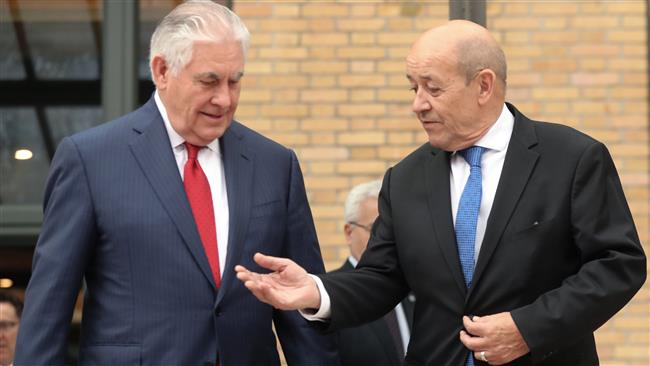
RNA - “There is a basic principle on which we are very firm, it’s the upholding of the (nuclear deal) to the extent it is respected,” Jean-Yves Le Drian said ahead of a meeting with US Secretary of State Rex Tillerson in Paris on Tuesday.
The top French diplomat also noted that the International Atomic Energy Agency (IAEA), the the United Nations nuclear watchdog, has verified Iranian compliance with the agreement and thus there was no source of worry.
“If it is respected by Iran -- which is what the IAEA says, and we don’t have any reason not to believe it - the signatories must stand by their word,” he said. “Because when an agreement is signed, each signatory must respect it. He (Tillerson) knows it.”
Earlier this month, US President Donald Trump extended waivers of key economic sanctions on Iran, lifted under the nuclear deal, for another 120 days but said he was doing so “for the last time.”
He also called on European allies and the US Congress to work with him to “fix the disastrous flaws” in the pact, officially called the Joint Comprehensive Plan of Action (JCPOA), or face a US exit.
Elsewhere in his comments, Le Drian questioned why the Trump administration was “kicking the ball back to Congress and the Europeans,” when Russia and China were also parties to the deal.
Tillerson has traveled to Europe in an attempt to seek support for the US president’s hostile stance on the JCPOA.
On Monday, the US secretary of state met with British Prime Minister Theresa May, Foreign Secretary Boris Johnson and National Security Adviser Mark Sedwill.
After the meetings, Tillerson said that they had agreed to set up a working group of experts on fixing flaws in the Iran deal.
The group will soon begin to develop a “side agreement” to the JCPOA aimed at easing President Trump’s complaints about the agreement, he told reporters in London.
However, Russian Deputy Foreign Minister Sergei Ryabkov said on Tuesday that the new US push aimed at making revisions to the Iran nuclear deal is unlikely to bring forth “positive” results.
The JCPOA was reached between Iran and the P5+1 countries — namely the US, Russia, China, France, Britain, and Germany — in July 2015 and took effect in January 2016.
Trump is opposed to the JCPOA, which was negotiated by his predecessor, Barack Obama, and warned that he might ultimately “terminate” the deal.
847/940